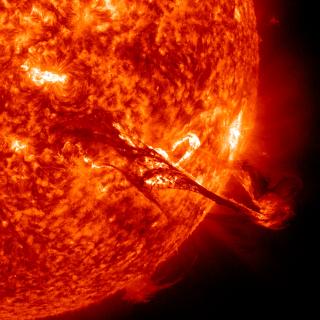Bibcode
Montes-Solís, M.; Arregui, I.
Referencia bibliográfica
Astronomy and Astrophysics, Volume 622, id.A88, 12 pp.
Fecha de publicación:
2
2019
Revista
Número de citas
7
Número de citas referidas
7
Descripción
Context. High resolution observations have permitted the resolution of
solar prominences/filaments into sets of threads/fibrils. However, the
values of the physical parameters of these threads and their structuring
remain poorly constrained. Aims: We use prominence seismology
techniques to analyse transverse oscillations in threads by comparing
magnetohydrodynamic (MHD) models and observations. Methods: We
applied Bayesian methods to obtain two different types of information.
We first inferred the marginal posterior distribution of physical
parameters such as the magnetic field strength or length of the thread,
when a totally filled tube, partially filled tube, and three damping
models are considered as certain; the three damping models are resonant
absorption in the Alfvén continuum, resonant absorption in the
slow continuum, and Cowling's diffusion. Then, we compared the relative
plausibility between alternative MHD models by computing the Bayes
factors. Results: Well-constrained probability density
distributions can be obtained for the magnetic field strength, length of
the thread, density contrast, and parameters associated with the damping
models. In a comparison of the damping models of resonant absorption in
the Alfvén continuum, resonant absorption in the slow continuum,
and Cowling's diffusion due to partial ionisation of prominence plasma,
the resonant absorption in the Alfvén continuum is the most
plausible mechanism to explain the existing observations. Relations
between periods of fundamental and first overtone kink modes with values
around 1 are better explained by expressions of the period ratio in the
long thread approximation, while the rest of the values are more
probable in the short thread limit for the period ratio.
Conclusions: Our results show that Bayesian analysis offers valuable
methods to perform parameter inference and a model comparison in the
context of prominence seismology.
Proyectos relacionados

Magnestismo Solar y Estelar
Los campos magnéticos son uno de los ingredientes fundamentales en la formación de estrellas y su evolución. En el nacimiento de una estrella, los campos magnéticos llegan a frenar su rotación durante el colapso de la nube molecular, y en el fin de la vida de una estrella, el magnetismo puede ser clave en la forma en la que se pierden las capas
Tobías
Felipe García